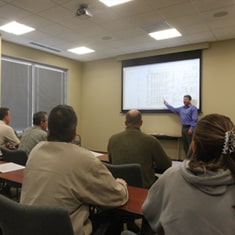
Singleton Training

Singleton Training
Training is conducted in four phases:
- Formal classroom training
- On-the-job demonstrations
- Performance evaluations
- Feedback/corrective action
Singleton superintendents, foremen and sub-foremen must successfully complete an Occupational Health and Safety (OSHA) 10-hour course, whereas all Singleton employees must attend a Safety Training Orientation that covers the company’s Policy and Commitment to Safety, Incident Prevention Program, and our Managed Return to Work Program. The orientation also covers the Life Safety Programs section of the Singleton Electric Corporate Safety and Health Program. Topics include:
- Inspection policies and procedures
- Fall protection
- Hazard communication
- Housekeeping
- Personal protective equipment
- Emergency action plan
- Hazardous energy control
- Electrical safety
- Fire protection
- Material handling
In addition to our Life Safety Programs, employees are trained in areas that directly impact their everyday job routines. Topics include:
- First aid
- CPR
- Permit-required confined space
- Electrical safe work practices – NFPA 70E Standard for Electrical Safety in the Workplace®
- Scaffolding
- Excavation
- Ladders and stairways
- Tools
- Extended reach forklift
- Fixed mast forklift
- Scissor lift
- Power actuated tools
Singleton superintendents, foremen and sub-foremen must successfully complete an Occupational Health and Safety (OSHA) 10-hour course, which is the primary method to train construction supervisors in the basics of occupational safety and health.